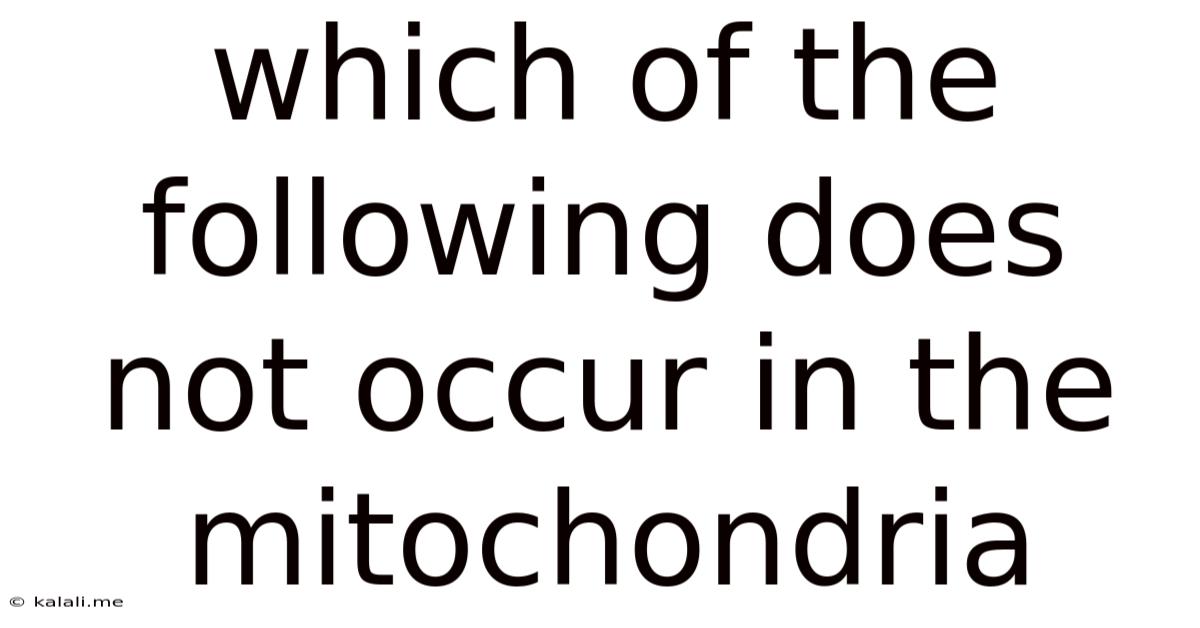Which Of The Following Does Not Occur In The Mitochondria
Kalali
Jun 11, 2025 · 3 min read

Table of Contents
Which of the Following Does Not Occur in the Mitochondria? A Deep Dive into Cellular Respiration
The mitochondrion, often called the "powerhouse of the cell," is a crucial organelle responsible for generating most of the cell's supply of adenosine triphosphate (ATP), the primary energy currency. Understanding its functions is vital for grasping cellular processes. This article will explore the processes that do occur in the mitochondria and, by extension, highlight which processes are absent. Understanding mitochondrial function is key to comprehending various biological processes and diseases.
Key Processes Occurring in the Mitochondria:
The mitochondrion is the site of several key metabolic pathways, including:
-
Cellular Respiration: This is the primary function of the mitochondria. It's a series of redox reactions that convert nutrients like glucose into ATP. This process involves several key stages:
- Glycolysis: While initiated in the cytoplasm, glycolysis's products feed into the mitochondrial processes.
- Pyruvate Oxidation: Pyruvate, the end product of glycolysis, is transported into the mitochondrial matrix where it's converted to Acetyl-CoA.
- Krebs Cycle (Citric Acid Cycle): Acetyl-CoA enters the Krebs cycle, a series of reactions that further oxidize carbon molecules, generating high-energy electron carriers (NADH and FADH2).
- Oxidative Phosphorylation (Electron Transport Chain and Chemiosmosis): This final stage utilizes the electron carriers from the Krebs cycle to generate a proton gradient across the inner mitochondrial membrane. This gradient drives ATP synthesis via ATP synthase. This is where the majority of ATP is produced.
-
Beta-oxidation of Fatty Acids: Mitochondria break down fatty acids into acetyl-CoA molecules, which then enter the Krebs cycle. This is a significant energy source, particularly during periods of fasting or intense exercise.
-
Amino Acid Catabolism: Certain amino acids are broken down in the mitochondria, contributing to the Krebs cycle.
Processes NOT Occurring in the Mitochondria:
Knowing the above, we can now identify processes that don't take place within the mitochondria:
-
Protein Synthesis (Translation): While mitochondria possess their own ribosomes (mitochondrial ribosomes), they primarily synthesize a limited number of proteins needed for their own function. The vast majority of proteins found in mitochondria are encoded by nuclear DNA, translated in the cytoplasm by cytoplasmic ribosomes, and then imported into the mitochondria.
-
Glycolysis (primarily): Although glycolysis initiates the process of glucose breakdown, the majority of the glycolytic pathway occurs in the cytoplasm. Only the products of glycolysis enter the mitochondria.
-
Photosynthesis: This process occurs exclusively in chloroplasts of plant cells and some other photosynthetic organisms. Mitochondria are not involved in photosynthesis.
-
DNA Replication (primarily): Although mitochondrial DNA replicates within the mitochondrion, the majority of the cell's DNA replication occurs in the nucleus.
-
Lipid Synthesis (primarily): Although some lipid metabolism occurs in the mitochondria, the majority of lipid synthesis and processing occurs in the endoplasmic reticulum and the cytoplasm.
Conclusion:
The mitochondrion is a highly specialized organelle with a vital role in cellular energy production. However, it is important to remember its function is limited. Processes such as protein synthesis, DNA replication, and photosynthesis occur elsewhere in the cell. Understanding these distinctions is crucial for a comprehensive grasp of cellular biology and the intricate interplay between organelles. Further research continues to unravel the complexities of mitochondrial function and its role in various cellular processes and diseases.
Latest Posts
Latest Posts
-
How Long Ago Was The 16th Century
Jul 01, 2025
-
How Many Inches Are In 4 Yards
Jul 01, 2025
-
How Many Calories In A Pound Of Hamburger
Jul 01, 2025
-
How Many Ounces Are In 9 Pounds
Jul 01, 2025
-
What Kind Of Room Has No Doors Or Windows
Jul 01, 2025
Related Post
Thank you for visiting our website which covers about Which Of The Following Does Not Occur In The Mitochondria . We hope the information provided has been useful to you. Feel free to contact us if you have any questions or need further assistance. See you next time and don't miss to bookmark.